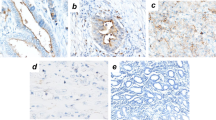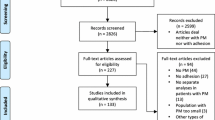Abstract
Intraperitoneally administrated epithelial cellular adhesion molecule (EpCAM) monoclonal antibody is a therapeutic agent in patients with malignant effusion in several types of carcinoma. However, the role of EpCAM in peritoneal metastasis (PM) lesions and primary lesions of gastric cancer (GC) is still unclear. Therefore, in this study, we investigated EpCAM expression in GC patients with PM. We investigated the expression of EpCAM in 35PM lesions and 104 biopsy samples as primary lesions. Immunohistochemical staining was performed using the Ventana Benchmark XT (Roche Diagnostics) system. EpCAM expression was evaluated by calculating the total immunostaining score, which is the product of the proportion score and the intensity score. Overexpression was defined as a total score greater than 4. All PM specimens showed overexpression of EpCAM, and GC cells in both the surface layer and the deep layer of the PM showed a high expression of EpCAM. Meanwhile, in the biopsy sample, the expression of EpCAM ranged from none to strong. The EpCAM score results for PM specimens and biopsy samples were 11.0 ± 2.0 and 6.9 ± 3.9, respectively. The difference between the scores was statistically significant (P < 0.05). The intraperitoneally administrated EpCAM antibody might have a anti-cancer effect in PM lesions of GC. Additionally, it can be assumed that only GC cells which express a high level of EpCAM might metastasize to the peritoneum.


Similar content being viewed by others
References
Corley DA, Buffler PA (2001) Oesophageal and gastric cardia adenocarcinomas: analysis of regional variation using the Cancer Incidence in Five Continents database. Int J Epidemiol 30(6):1415–1425
Koizumi W, Narahara H, Hara T, Takagane A, Akiya T, Takagi M, Miyashita K, Nishizaki T, Kobayashi O, Takiyama W, Toh Y, Nagaie T, Takagi S, Yamamura Y, Yanaoka K, Orita H, Takeuchi M (2008) S-1 plus cisplatin versus S-1 alone for first-line treatment of advanced gastric cancer (SPIRITS trial): a phase III trial. Lancet Oncol 9(3):215–221. doi:10.1016/S1470-2045(08)70035-4
Sadeghi B, Arvieux C, Glehen O, Beaujard AC, Rivoire M, Baulieux J, Fontaumard E, Brachet A, Caillot JL, Faure JL, Porcheron J, Peix JL, Francois Y, Vignal J, Gilly FN (2000) Peritoneal carcinomatosis from non-gynecologic malignancies: results of the EVOCAPE 1 multicentric prospective study. Cancer 88(2):358–363. doi:10.1002/(SICI)1097-0142(20000115)88:2<358::AID-CNCR16>3.0.CO;2-O
Hartung G, Hofheinz RD, Dencausse Y, Sturm J, Kopp-Schneider A, Dietrich G, Fackler-Schwalbe I, Bornbusch D, Gonnermann M, Wojatschek C, Lindemann W, Eschenburg H, Jost K, Edler L, Hochhaus A, Queisser W (2005) Adjuvant therapy with edrecolomab versus observation in stage II colon cancer: a multicenter randomized phase III study. Onkologie 28(6–7):347–350. doi:10.1159/000084595
Went P, Vasei M, Bubendorf L, Terracciano L, Tornillo L, Riede U, Kononen J, Simon R, Sauter G, Baeuerle PA (2006) Frequent high-level expression of the immunotherapeutic target Ep-CAM in colon, stomach, prostate and lung cancers. Br J Cancer 94(1):128–135. doi:10.1038/sj.bjc.6602924
Varga M, Obrist P, Schneeberger S, Muhlmann G, Felgel-Farnholz C, Fong D, Zitt M, Brunhuber T, Schafer G, Gastl G, Spizzo G (2004) Overexpression of epithelial cell adhesion molecule antigen in gallbladder carcinoma is an independent marker for poor survival. Clin Cancer Res 10(9):3131–3136
Baeuerle PA, Gires O (2007) EpCAM (CD326) finding its role in cancer. Br J Cancer 96(3):417–423. doi:10.1038/sj.bjc.6603494
Heiss MM, Murawa P, Koralewski P, Kutarska E, Kolesnik OO, Ivanchenko VV, Dudnichenko AS, Aleknaviciene B, Razbadauskas A, Gore M, Ganea-Motan E, Ciuleanu T, Wimberger P, Schmittel A, Schmalfeldt B, Burges A, Bokemeyer C, Lindhofer H, Lahr A, Parsons SL (2010) The trifunctional antibody catumaxomab for the treatment of malignant ascites due to epithelial cancer: results of a prospective randomized phase II/III trial. Int J Cancer 127(9):2209–2221. doi:10.1002/ijc.25423
Linke R, Klein A, Seimetz D (2010) Catumaxomab: clinical development and future directions. MAbs 2(2):129–136
Imano M, Peng YF, Itoh T, Nishikawa M, Satou T, Yasuda A, Inoue K, Kato H, Shinkai M, Tsubaki M, Yasuda T, Imamoto H, Nishida S, Furukawa H, Takeyama Y, Okuno K, Shiozaki H (2012) A preliminary study of single intraperitoneal administration of paclitaxel followed by sequential systemic chemotherapy with S-1 plus paclitaxel for advanced gastric cancer with peritoneal metastasis. Anticancer Res 32(9):4071–4075
Spizzo G, Obrist P, Ensinger C, Theurl I, Dunser M, Ramoni A, Gunsilius E, Eibl G, Mikuz G, Gastl G (2002) Prognostic significance of Ep-CAM AND Her-2/neu overexpression in invasive breast cancer. Int J Cancer 98(6):883–888. doi:10.1002/ijc.10270
Wenqi D, Li W, Shanshan C, Bei C, Yafei Z, Feihu B, Jie L, Daiming F (2009) EpCAM is overexpressed in gastric cancer and its downregulation suppresses proliferation of gastric cancer. J Cancer Res Clin Oncol 135(9):1277–1285. doi:10.1007/s00432-009-0569-5
Passebosc-Faure K, Li G, Lambert C, Cottier M, Gentil-Perret A, Fournel P, Perol M, Genin C (2005) Evaluation of a panel of molecular markers for the diagnosis of malignant serous effusions. Clin Cancer Res 11(19 Pt 1):6862–6867. doi:10.1158/1078-0432.CCR-05-0043
Diaz-Arias AA, Loy TS, Bickel JT, Chapman RK (1993) Utility of BER-EP4 in the diagnosis of adenocarcinoma in effusions: an immunocytochemical study of 232 cases. Diagn Cytopathol 9(5):516–521
De Angelis M, Buley ID, Heryet A, Gray W (1992) Immunocytochemical staining of serous effusions with the monoclonal antibody Ber-EP4. Cytopathology 3(2):111–117
Munz M, Kieu C, Mack B, Schmitt B, Zeidler R, Gires O (2004) The carcinoma-associated antigen EpCAM upregulates c-myc and induces cell proliferation. Oncogene 23(34):5748–5758. doi:10.1038/sj.onc.1207610
Osta WA, Chen Y, Mikhitarian K, Mitas M, Salem M, Hannun YA, Cole DJ, Gillanders WE (2004) EpCAM is overexpressed in breast cancer and is a potential target for breast cancer gene therapy. Cancer Res 64(16):5818–5824. doi:10.1158/0008-5472.CAN-04-0754
Winter MJ, Nagelkerken B, Mertens AE, Rees-Bakker HA, Briaire-de Bruijn IH, Litvinov SV (2003) Expression of Ep-CAM shifts the state of cadherin-mediated adhesions from strong to weak. Exp Cell Res 285(1):50–58
Du W, Ji H, Cao S, Wang L, Bai F, Liu J, Fan D (2010) EpCAM: a potential antimetastatic target for gastric cancer. Dig Dis Sci 55(8):2165–2171. doi:10.1007/s10620-009-1033-8
Imano M, Imamoto H, Itoh T, Satou T, Peng YF, Yasuda A, Kato H, Shiraishi O, Shinkai M, Yasuda T, Takeyama Y, Okuno K, Shiozaki H (2012) Safety of intraperitoneal administration of paclitaxel after gastrectomy with en-bloc D2 lymph node dissection. J Surg Oncol 105(1):43–47
Sugarbaker PH, Yonemura Y (2000) Clinical pathway for the management of resectable gastric cancer with peritoneal seeding: best palliation with a ray of hope for cure. Oncology 58(2):96–107
Liu G, Yuan X, Zeng Z, Tunici P, Ng H, Abdulkadir IR, Lu L, Irvin D, Black KL, Yu JS (2006) Analysis of gene expression and chemoresistance of CD133+ cancer stem cells in glioblastoma. Mol Canc 5:67. doi:10.1186/1476-4598-5-67
Alkatout I, Kabelitz D, Kalthoff H, Tiwari S (2008) Prowling wolves in sheep's clothing: the search for tumor stem cells. Biol Chem 389(7):799–811. doi:10.1515/BC.2008.094
Han ME, Jeon TY, Hwang SH, Lee YS, Kim HJ, Shim HE, Yoon S, Baek SY, Kim BS, Kang CD, Oh SO (2011) Cancer spheres from gastric cancer patients provide an ideal model system for cancer stem cell research. Cell Mol Life Sci 68(21):3589–3605. doi:10.1007/s00018-011-0672-z
Acknowledgments
The authors express their appreciation to Dr. Harumasa Ohyanagi, vice board director of the University of KinDAI Himeji for his expert comments on the manuscript. We also wish to thank Mr. Tadao Uesugi and Miss Fusako Kamada for technical assistance.
Conflict of interest
The authors have no conflicts of interest to declare.
Author information
Authors and Affiliations
Corresponding author
Rights and permissions
About this article
Cite this article
Imano, M., Itoh, T., Satou, T. et al. High expression of epithelial cellular adhesion molecule in peritoneal metastasis of gastric cancer. Targ Oncol 8, 231–235 (2013). https://doi.org/10.1007/s11523-012-0239-4
Received:
Accepted:
Published:
Issue Date:
DOI: https://doi.org/10.1007/s11523-012-0239-4




